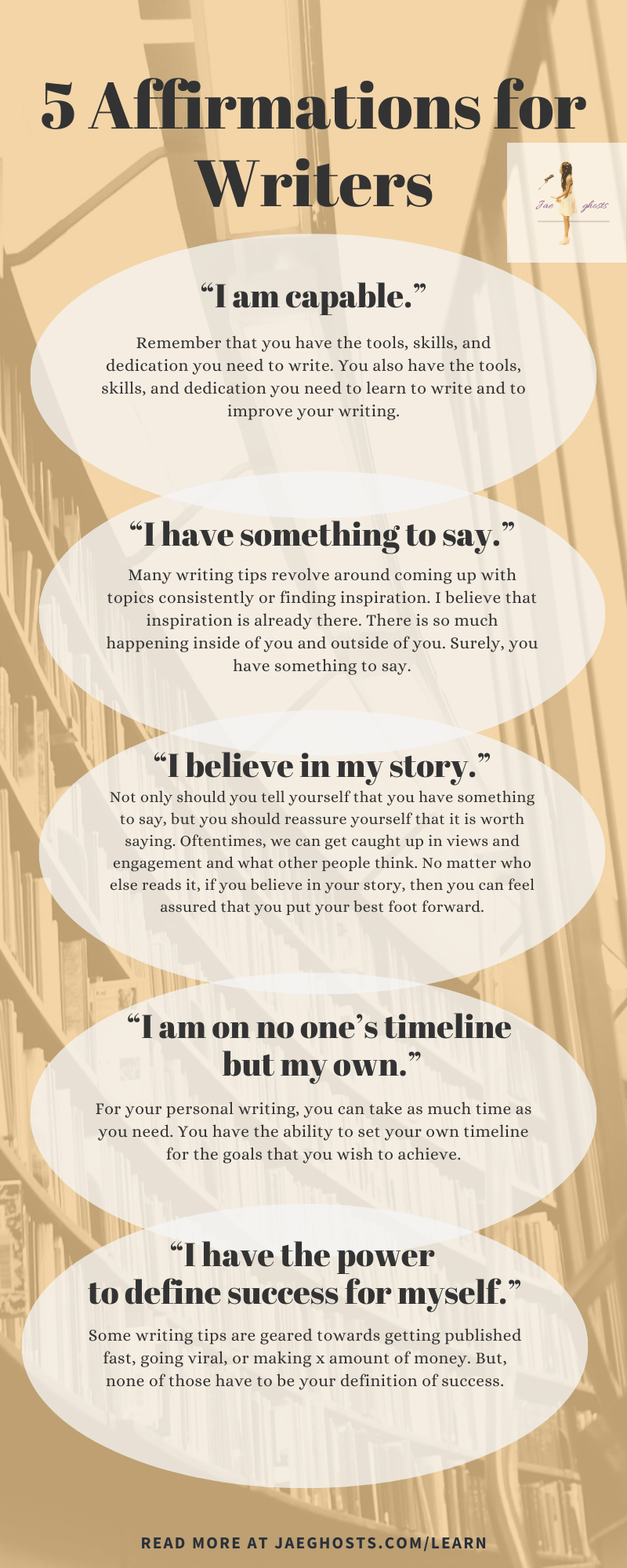Tired of Reading Useless Writing Tips?
Here are some affirmations instead.
When someone interviews an established writer, they almost always ask, “Do you have any writing tips?” We want to follow our role models' footsteps, and we often think that means discovering some magic key. There is a lot of writing advice out there. While some of the tips are helpful, the advice from different writers is often contradictory.
For instance, one writer may suggest that you make your stories personal. Then, another writer will say, “You’re not that special. Focus on the reader!” Or, someone may tell you to take as much time as you need to write while someone else suggests you hit publish and stop thinking so much.
The truth is — as you probably already know — the only thing that works is whatever works for you. I like to read writing tips to get ideas about other people’s processes. But the only way to find out how you write best is through trial and error. You try, you adjust, and you try again.
I’ve realized that I tend to read writing tips when I’m feeling insecure. I feel like someone else must know the secrets that I don’t know. Or that my process isn’t good enough because I’m not meeting XYZ milestones like this other person. If you’re anything like me, then sometimes you just need affirmations, not tips. Sometimes you just have to affirm yourself that you can do whatever you set out to do.
For that reason, I started keeping a list of positive affirmations that I tell myself before I type a single word. Some of these daily affirmations include:
“I am capable.”
Before you can worry about the ins-and-outs of what you’re doing and how you’re doing it, you should reassure yourself that you can, in fact, do it. You can. You have the tools, skills, and dedication you need to write. You also have the tools, skills, and dedication you need to learn to write and to improve your writing.
You can recite this affirmation as it is — to remind yourself that you are capable — or you can add a specific goal. For instance, you could say, “I am capable of writing the story I want to write today.” Or, “I am capable of becoming the writer I want to be.”
“I have something to say.”
Many writing tips revolve around coming up with topics consistently or finding inspiration. I believe that inspiration is already there. There is so much happening inside of you and outside of you. Surely, you have something to say.
Additionally, unless you became a writer for the money, you began because you wanted to put words on a page. You know what those words are. By reassuring yourself that you have something to say, you take the first step to finding the stories that are very specific to you. The stories that are calling on you to write them.
Sometimes I tell myself I have something to say even when I’m not sure I do, and a topic always comes to mind. Maybe I don’t have answers today, but I know I have an endless stream of questions. Maybe I don’t have something extremely profound today, but there’s a movie I saw that I’d love to tell others about. That’s all fine.
You have experiences, a life, and thoughts that have drawn you to the page. So, remind yourself that you have ideas to fill it with.
“I believe in my story.”
Not only should you tell yourself that you have something to say, but you should reassure yourself that it is worth saying. Oftentimes, we can get caught up in views and engagement and what other people think. No matter who else reads it, if you believe in your story, then you can feel assured that you put your best foot forward.
By believing in what you are writing and why you are writing it, you can avoid disappointment if other people don’t receive it well. You also increase your motivation to write your story to the best of your ability and to advocate for it if needed.
Believing in what you write is not the same as thinking that everything you write is gold and waving away criticism. It’s simply encouragement to keep going. After all, you are the first person who needs to believe in your story.
“I am on no one’s timeline but my own.”
Whether you’re writing news articles, blog posts, a screenplay, a novel, or whatever else, there will always be someone who will tell you when you should finish. Or that someone will tell you how often you should be writing and how much. But, for your personal writing, you can take as much time as you need. You have the ability to set your own timeline for the goals that you wish to achieve.
This is not an excuse to procrastinate. Being on your own timeline means that you free yourself from the deadlines that others try to impose on you. Simultaneously, you free yourself from negative feelings that may come with not meeting the same milestones that someone else met in a certain timeframe.
“I have the power to define success for myself.”
Importantly, you define your success. Some writing tips are geared towards getting published fast, going viral, or making x amount of money. But, none of those have to be your definition of success. (Though, if they are, that’s cool too.)
Personally, I feel successful every time I put a thought down on paper, no matter what I do with it next. If you are writing, then you are a successful writer.
After saying this affirmation, it can help to write down your definition of success. Maybe you have certain goals you want to reach. When goal-setting, try to write down goals that you can control. A goal that reads, “I want to get x amount of followers this month,” isn’t extremely helpful because whether people follow you is out of your control. However, if you want to increase your followers, you can set a goal to interact with more people or do more promos for your work this month. These goals (or steps towards the bigger goal) are more tangible and active.
Setting your own definition of success and creating self-oriented goals to meet that definition can help writing seem like less of a mountain to climb.
You Got This
There are a lot of factors that make things hard for writers. For me, one of them is that people have always told me that writing isn’t a “real job,” and I shouldn’t pursue it. Because of that, I sometimes feel like if I’m not an instant bestseller, I should probably give up.
When I browse the internet in search of other people’s success stories and advice, I’m really searching for validation. Confirmation that I’m doing something right. Well, the right thing to do is subjective. If what you really need is permission or validation, you have the power to give it to yourself. You can say these affirmations before you start writing every day or come up with your own based on what you need. Either way, you got this.


